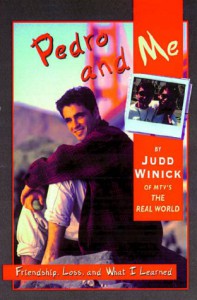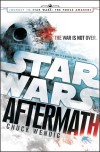Pedro and Me
 It’s odd to come around to this graphic biography by way of everything else Judd Winick has done. I remember “The Real World,” and I even remember seeing a few episodes from the season where he was a cast member (I remember Puck, but that’s about it), but I came to appreciate the writer/artist through Frumpy the Clown. And I wouldn’t even have discovered that strip had I not stumbled across a collection of the strips in a clearance book store.
It’s odd to come around to this graphic biography by way of everything else Judd Winick has done. I remember “The Real World,” and I even remember seeing a few episodes from the season where he was a cast member (I remember Puck, but that’s about it), but I came to appreciate the writer/artist through Frumpy the Clown. And I wouldn’t even have discovered that strip had I not stumbled across a collection of the strips in a clearance book store.Both Frumpy the Clown and Barry Ween, Boy Genius have a sense of lunacy about them, so it was somewhat surprising to read something that was so deep and serious. There were moments where that lunacy came through, but only in the moments in the story where that emotion shone through. And let’s be frank: In the real world, those moments of lunacy are few and far between. But the difference in tone also wasn’t that surprising, because even in his other two major works, Winick manages to impart a real seriousness amid all the wacky antics that happen to his characters. It’s just that the story he tells about Pedro carries a certain weight that requires a more serious tone.
And what a story it is. The beauty of stories, fictional and otherwise, is that while the writer brings the story to the page, the reader is the one who brings the emotion and the perspective that can make it effective. Brilliant writers can draw that emotion out of their readers, but our own emotional response to a story depends on what we’ve experienced ourselves, and how that relates to the story that’s being told. Pedro’s story is inspiring on many different levels, but for me, it resonated because it talked about how we’re seen after we die. The last few lines of the story are, “But not a day goes by that I don’t think of him. I guess that’s his legacy. That we remember. We honor those we love by remembering them.” And the story suggests that the more good we do, the more we have to offer to other people, then the more we are remembered, and the more impact we have on others in our lives, even after death. It transcends ideas of faith and spirituality and reminds us that there are plenty of ways that we can make a difference in the world.
The story is one of courage and honesty, and for that alone, people should be reading this book. Winick’s artwork sometimes doesn’t seem appropriate for the subject matter (his style is more cartoony than anything else, and while that works perfectly for Frumpy and Barry Ween, it sometimes seems out of place in this serious story), but one can really see the difference in the way he approached the artwork in this story. It seems to have more gravity, but at the same time, it creates an odd dissonance between the story and the art. It’s a small gripe, and one that didn’t break my connection with the story (it still brought me to tears at the end), but it’s something to mention.
I understand that this book is now required reading for some high schools, and I’m very much in favor of that decision. While it tells Pedro’s story without flinching, it also tells the author’s story of how he dealt with the idea of having a friend with AIDS. He doesn’t shy away from admitting his initial reluctance, and I think that’s probably one of the crucial points in the story. We, as people, fear what we don’t understand, but once we have a reason to come to understand something as complex as AIDS, such as coming to be very close to someone who lives with it, we learn to have more patience and understanding about it.
I highly recommend this story to anyone. Like Markus Zusak and The Book Thief, Pedro and Me was the story that Judd Winick was born to write.






